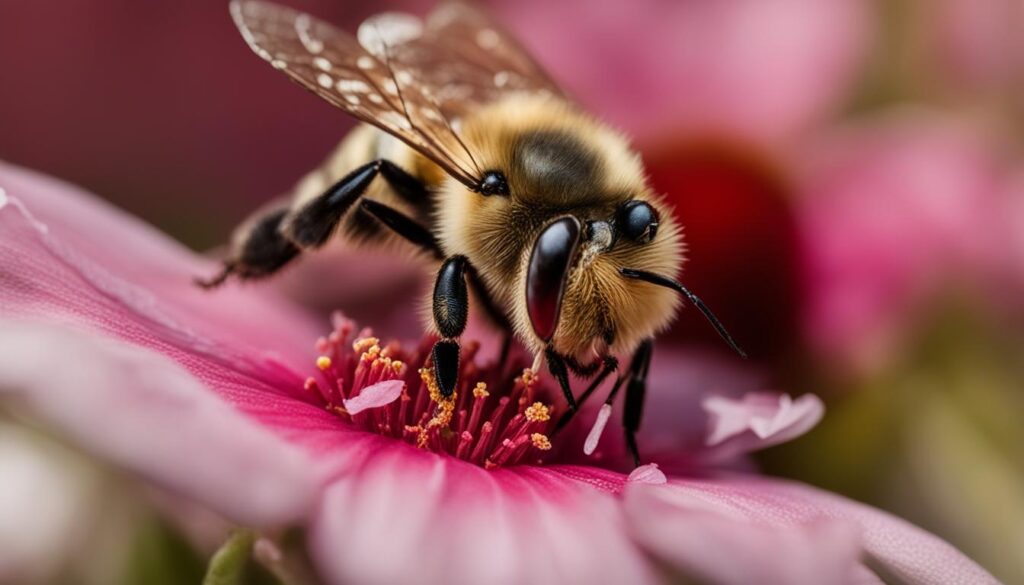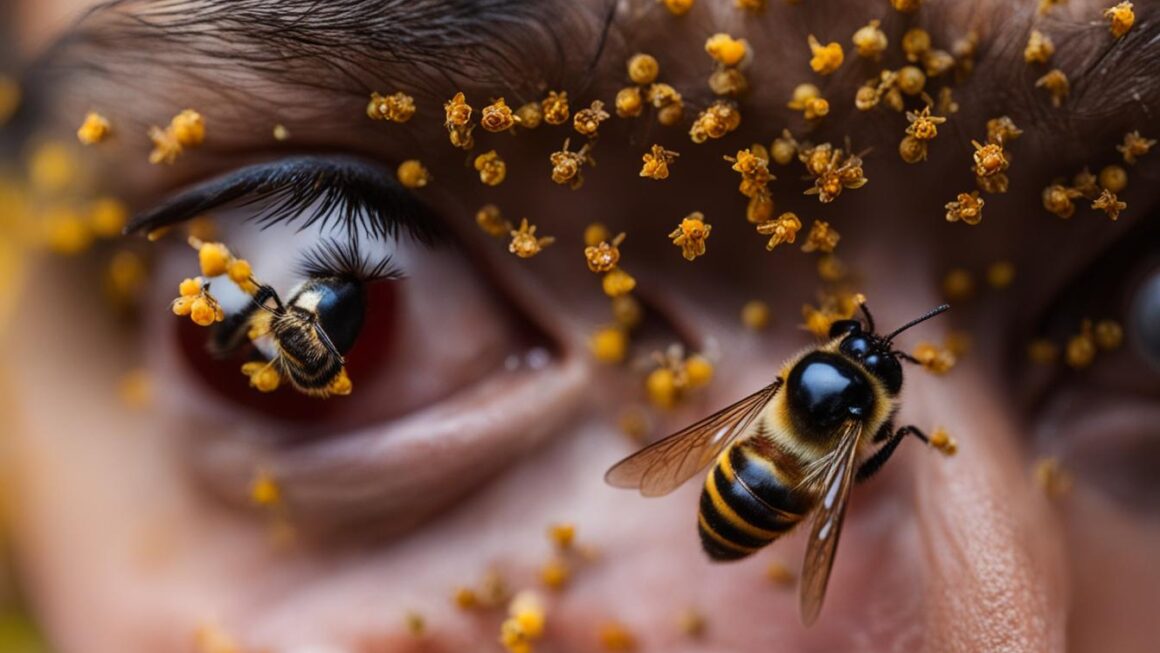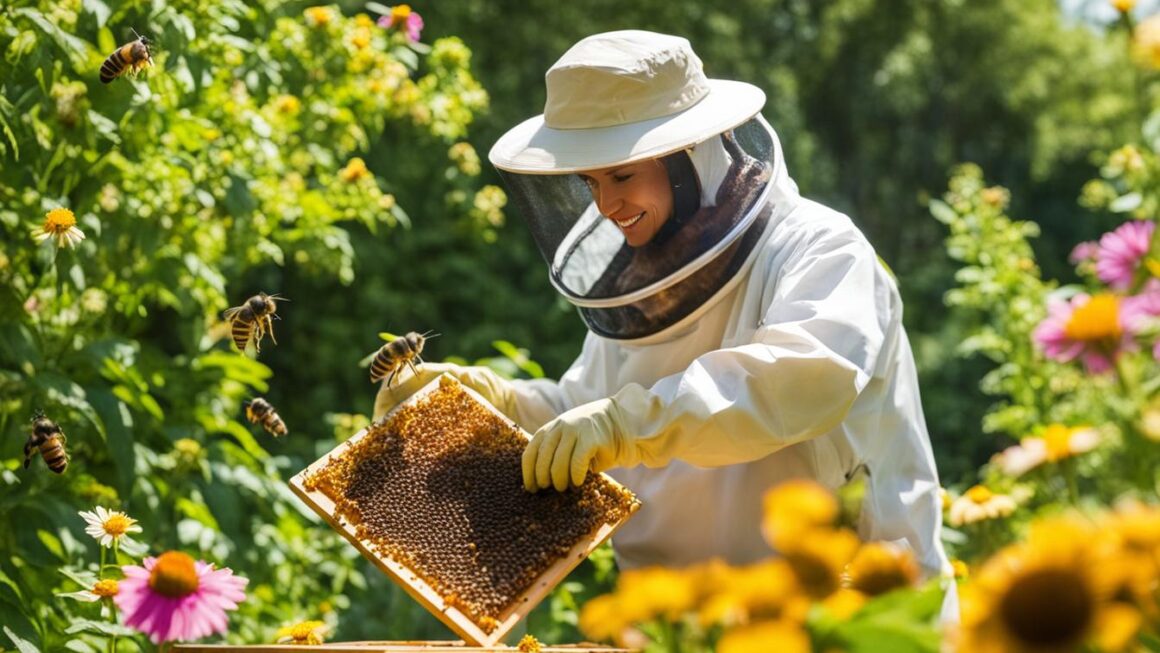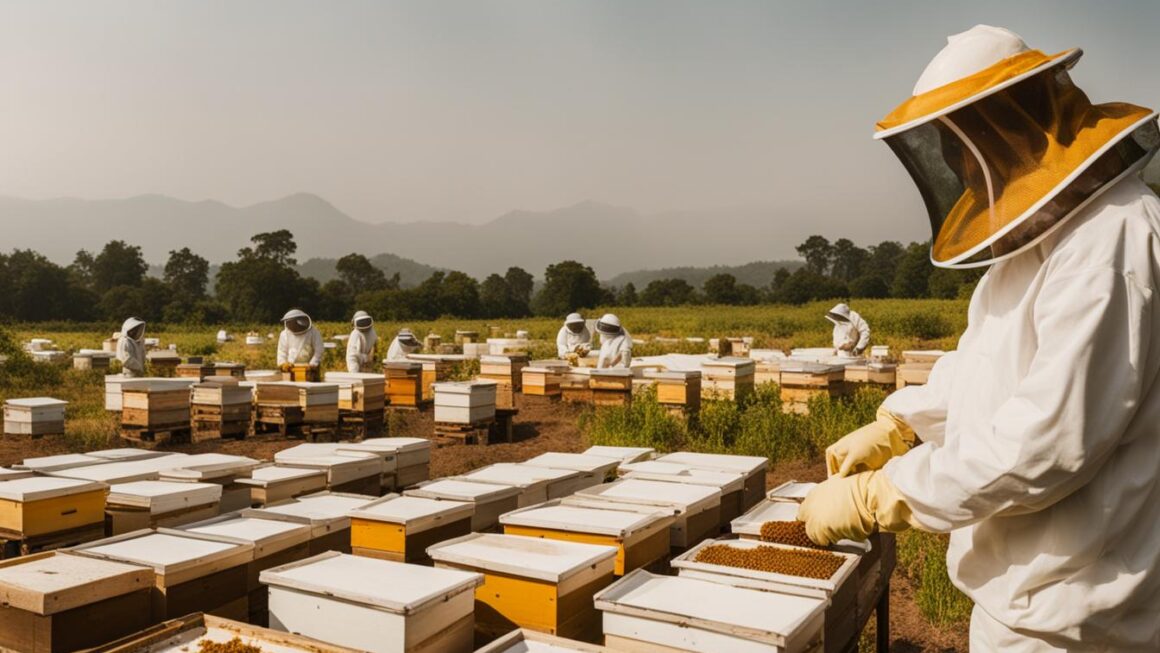Bee pollen has gained popularity as a superfood due to its rich nutritional composition. However, scientific research has yet to confirm any specific health benefits associated with bee pollen. While it contains essential vitamins, minerals, carbohydrates, lipids, and protein, there is no evidence to support claims that it can cure health problems or enhance athletic performance.
Let’s delve deeper into the world of bee pollen to understand its composition, potential claims, side effects, lack of scientific evidence, recommended usage, and the importance of allergy awareness.
- Bee pollen lacks scientific evidence for specific health benefits.
- Bee pollen may cause rare but serious side effects, including allergic reactions.
- Claims about bee pollen’s health benefits often lack substantial scientific support.
- The recommended usage of bee pollen is unclear, and caution should be exercised when considering its use.
- Allergy awareness is crucial, especially for individuals with pollen allergies, as bee pollen can trigger allergic reactions.
What is Bee Pollen?
Bee pollen is the pollen collected by bees as they fly from flower to flower. It is a mixture of plant pollen, bee saliva, and possibly other substances. Bee pollen is available as a dietary supplement and is sometimes used in skincare products. It contains minerals, vitamins, sugars, amino acids, fatty acids, flavonoids, and bioelements.
The composition of bee pollen varies depending on the plant sources, soil type, and climate. Different plants produce different types of pollen, and bees collect pollen from a variety of flowers, resulting in a diverse composition of bee pollen. This composition makes bee pollen a rich source of nutrients that may offer potential health benefits.
Bee Pollen Composition
| Nutrient | Percentage |
|---|---|
| Proteins | 20-30% |
| Amino Acids | 10-20% |
| Vitamins | 2-15% |
| Minerals | 1-10% |
| Carbohydrates | 25-40% |
| Lipids | 2-10% |
| Flavonoids | 1-5% |
| Bioelements | 1-5% |
The percentages listed in the table are approximate and can vary depending on the specific bee pollen sample. The wide range of nutrients in bee pollen contributes to its potential health benefits, making it an intriguing natural supplement.
Bee Pollen: Exploring Claims and Potential Health Benefits
Bee pollen, a popular natural product, has gained attention for its potential health benefits. However, it is important to examine the claims surrounding bee pollen and understand the lack of scientific evidence supporting many of these claims. Let’s explore the purported health benefits and uses of bee pollen.
Health Benefits of Bee Pollen
Herbalists and natural health enthusiasts have attributed various health benefits to bee pollen, including improved athletic performance, enhanced immune function, and reduced PMS symptoms. Some suggest it may even lower heart disease risk factors and support liver function. However, it is essential to note that most of these claims lack scientific backing.
“While bee pollen shows some potential as a treatment for certain conditions, such as reducing PMS symptoms or improving allergies and asthma, the scientific evidence is limited and further research is needed.”
| Claimed Health Benefit | Status of Scientific Evidence |
|---|---|
| Improved athletic performance | Limited evidence, more research needed |
| Enhanced immune function | Limited evidence, more research needed |
| Reduced PMS symptoms | Limited evidence, more research needed |
| Lowered heart disease risk factors | Limited evidence, more research needed |
| Supported liver function | Limited evidence, more research needed |
While anecdotal reports and small-scale studies may suggest potential benefits, it is crucial to await further research before drawing definite conclusions about the health effects of bee pollen.
Other Uses of Bee Pollen
Besides the claimed health benefits, bee pollen is also used in skin care products due to its potential nutritive properties. It is believed to provide nourishment to the skin and promote a youthful appearance. However, similar to its internal uses, there is limited scientific evidence to support these claims.
“Many other uses of bee pollen, such as increasing strength or slowing aging, have not been extensively studied.”
It is important to approach these uses with caution and consult with a healthcare provider or dermatologist before incorporating bee pollen into your skincare routine.
Conclusion
In summary, while bee pollen has been praised for its potential health benefits, the scientific evidence supporting these claims is lacking. Many of the purported uses of bee pollen require further research to substantiate their effectiveness. It is important to approach bee pollen with realistic expectations and consult with a healthcare professional before using it as a dietary supplement or skincare product.
Potential Side Effects of Bee Pollen
Bee pollen is generally considered safe for short-term use, but it is important to be aware of potential side effects, particularly for individuals with allergies or sensitivities. Here are some possible side effects and considerations when using bee pollen:
Allergic Reactions and Pollen Allergies
Bee pollen retains the allergenic potential of the pollen from the plants, making it a potential trigger for allergic reactions in individuals with pollen allergies. Ingesting bee pollen can lead to symptoms such as itching, hives, swelling of the tongue, lips, and face, and difficulty breathing. These allergic reactions can be severe and require immediate medical attention. If you have a known allergy to pollen, it is best to avoid bee pollen or consult with an allergist before considering its use.
Phototoxic Reactions
Another potential side effect of bee pollen is phototoxicity, which can result in abnormal skin reactions when exposed to light. This can include rashes, redness, and increased sensitivity to sunlight. If you experience any unusual skin reactions after taking bee pollen, it is advisable to avoid direct sunlight and consult with a healthcare professional.
Renal Failure and Medication Interactions
In rare cases, bee pollen has been associated with renal failure. While the exact mechanism is not well understood, it is important to be cautious if you have a history of kidney problems or are taking medications that may affect kidney function. Additionally, bee pollen has the potential to interact with certain medications, such as warfarin, which can increase the risk of bleeding and bruising. If you are on any medications, it is crucial to inform your healthcare provider before considering bee pollen supplementation.
Overall, while bee pollen offers potential health benefits, it is essential to be aware of potential side effects and consult with a healthcare professional before incorporating it into your routine, especially if you have any underlying health conditions or are taking medications.
| Side Effects | Considerations |
|---|---|
| Allergic Reactions | Consult with an allergist if you have pollen allergies |
| Phototoxic Reactions | Avoid direct sunlight if you experience unusual skin reactions |
| Renal Failure | Exercise caution if you have kidney problems |
| Medication Interactions | Inform your healthcare provider if you are taking medications |
Lack of Scientific Evidence
Despite the claims made about bee pollen, there is a lack of scientific evidence to support its effectiveness for most health concerns. While a few small studies have shown promising results, more research is needed to determine whether bee pollen truly provides any benefits for conditions such as chronic prostatitis, PMS, or reducing side effects of radiation therapy for cancer. Many other uses of bee pollen, such as increasing strength or slowing aging, have not been studied extensively.
Researchers have yet to conduct large-scale, well-designed clinical trials to evaluate the potential health benefits of bee pollen. Without such studies, it is difficult to draw definitive conclusions about its efficacy. The existing research often consists of small-scale studies with limited sample sizes, which makes it challenging to extrapolate the findings to the general population.
Additionally, the studies conducted so far have produced mixed results, further highlighting the need for more rigorous research. Some studies have reported positive outcomes, while others have found no significant effects of bee pollen. This inconsistency further emphasizes the uncertainty surrounding the supposed health benefits of bee pollen.
In the absence of substantial scientific evidence, it is important to approach claims about bee pollen’s health benefits with caution. While it may be tempting to believe in the power of natural remedies, it is crucial to rely on evidence-based information when making decisions about our health and well-being.
Recommended Usage and Safety Considerations
When it comes to using bee pollen, it is important to consider the recommended dosage and safety precautions. Since bee pollen is an unproven treatment, there is no standard dosage that has been established. It is always best to consult with a healthcare provider before starting any new supplement, especially if you have any underlying health conditions or are taking medications. They can provide guidance on the appropriate dosage based on your specific needs.
It should be noted that bee pollen is not safe for everyone. It is not recommended for children, pregnant women, or breastfeeding women. Additionally, bee pollen can interact with certain medications, particularly blood thinners. If you are taking any medications, it is essential to discuss with your healthcare provider to avoid any potential interactions.
When using bee pollen, it is important to exercise caution and follow recommended guidelines. It is a good idea to start with a small dosage and monitor how your body reacts. If you experience any adverse effects, such as allergic reactions or discomfort, discontinue use and seek medical advice.
Safety Precautions for Bee Pollen Consumption
- Avoid bee pollen if you have a known allergy to pollen or bee stings.
- Do not exceed the recommended dosage, as excessive intake can increase the risk of side effects.
- Store bee pollen properly in a cool, dry place to maintain its quality and potency.
- Be cautious of bee pollen products that claim to be “miracle cures” or make exaggerated health claims.
Overall, bee pollen can be a beneficial supplement for some individuals, but it is important to approach its usage with caution. Consulting with a healthcare professional and following recommended guidelines will help ensure a safe and effective experience.

“Allergies to bee pollen can cause severe reactions, so it’s important for individuals to be aware of their allergy status and take appropriate precautions before consuming or using products containing bee pollen.”
Conclusion
While bee pollen has been touted as a superfood with numerous health benefits, the scientific evidence supporting these claims remains limited. Although bee pollen contains a variety of essential nutrients, there is no conclusive research to substantiate its effectiveness in treating specific health conditions or improving athletic performance.
It is important to exercise caution when considering the use of bee pollen as a dietary supplement. Rare but serious side effects, including allergic reactions, phototoxic reactions, renal failure, and interactions with medications, have been reported. Individuals with pollen allergies should be especially mindful of the potential for severe allergic reactions.
Before starting any new supplement, it is crucial to consult with a healthcare provider, especially if you have underlying health conditions or are taking medications. Moreover, bee pollen is not recommended for children, pregnant women, or breastfeeding women due to a lack of safety data.
In conclusion, while bee pollen may hold some promise as a treatment for certain conditions, it is important to approach its usage with caution. The potential health risks associated with bee pollen, along with the lack of scientific evidence, warrant further research to determine its true benefits and safety profile.
FAQ
Can bee pollen make you sick?
Bee pollen has been associated with rare but serious side effects, including allergic reactions, phototoxic reactions, renal failure, and interactions with medications. It can cause severe allergic reactions in individuals with pollen allergies and may interact with certain medications, especially blood thinners. It is important to use caution and consult with a healthcare provider before taking bee pollen.
What are the side effects of bee pollen?
The ingestion of bee pollen has been associated with symptoms such as itching, hives, swelling of the tongue, lips, and face, and difficulty breathing. It can also cause photosensitivity, resulting in abnormal skin reactions to light. In rare cases, bee pollen has been linked to renal failure and can interact with certain medications, such as warfarin, increasing the chance of bleeding and bruising.
What are the benefits of bee pollen?
While bee pollen has been hailed as a superfood by herbalists, scientific research has not been able to confirm any specific health benefits associated with bee pollen. It contains vitamins, minerals, carbohydrates, lipids, and protein, but there is no evidence to support claims that it can cure health problems or improve athletic performance.
How should bee pollen be used?
Since bee pollen is an unproven treatment, there is no standard recommended dosage. It is important to consult with a healthcare provider before taking any natural product, especially if you have any underlying health conditions or are taking medications. Bee pollen is not safe for children, pregnant women, or breastfeeding women. It may interact with certain medications, especially blood thinners. As with any dietary supplement, it is important to use caution and follow recommended guidelines.
Can bee pollen cause allergic reactions?
Bee pollen can trigger allergic reactions, especially in individuals with pollen allergies. Symptoms can include itching, redness, shortness of breath, hives, swelling, and in severe cases, anaphylaxis. It is important to be aware of potential allergies to bee pollen and consult with an allergist if necessary.
Is there scientific evidence to support the use of bee pollen?
Although bee pollen has been used for various health claims, there is a lack of scientific evidence to support its effectiveness for most health concerns. While a few small studies have shown promising results, more research is needed to determine whether bee pollen truly provides any benefits for specific conditions.




